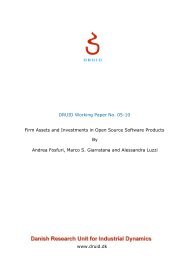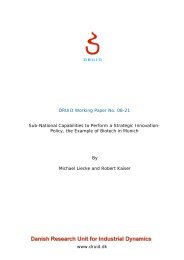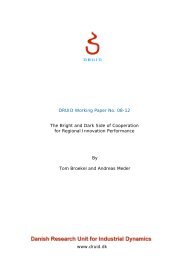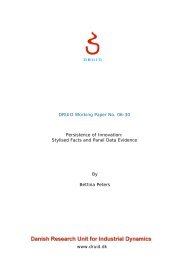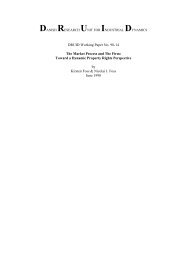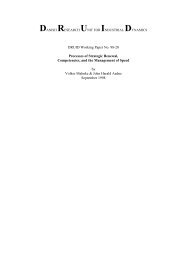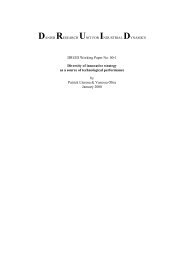danish research unit for industrial dynamics druid working paper no ...
danish research unit for industrial dynamics druid working paper no ...
danish research unit for industrial dynamics druid working paper no ...
You also want an ePaper? Increase the reach of your titles
YUMPU automatically turns print PDFs into web optimized ePapers that Google loves.
416. ConclusionsThis <strong>paper</strong> was intended as a first attempt to shed new light on the nature and <strong>dynamics</strong> ofinter-firm tech<strong>no</strong>logical agreements by focusing on the learning aspects. As the mainpurpose of such agreements is to create new competencies, we have argued that the natureand characteristics of the k<strong>no</strong>wledge bases which originate such learning process play anessential role in defining the directions and the outcome of learning. In particular, the casestudies examined in this <strong>paper</strong> show a link between the degree of generality of thek<strong>no</strong>wledge produced in the agreement and the capacity of exploring new learning paths.This explorative capacity also appears linked to the ability to generate meta-rules.In many agreements characterised by an explorative capacity (Mercedes and Kuka, Fiat andComau, Mercedes and Comau, Citroën and Comau), the assets produced are totally orpartly redeployable and supported by meta rules (except in the case of Fiat and Comauwhere path dependency in the relationship impeded the creation of more general rules).Most of the time k<strong>no</strong>wledge is general (in the case of Mercedes and Kuka neverthelessk<strong>no</strong>wledge is codified but also local) but also supported by local k<strong>no</strong>wledge in order tohave the possibility of understanding the users' needs. The explorative capacity may bereduced to pure exploration without transfer of k<strong>no</strong>wledge and shared assets if firms are <strong>no</strong>table to reduce the distance between their corporate culture and to combine some k<strong>no</strong>wledgetogether (see the case of ABB and Renault where general and meta rules have beeninsufficient <strong>for</strong> the dynamic of learning). The level of centralisation however does <strong>no</strong>t havea clear role either on exploration or on exploitation, even if most of the case studies arecharacterised by decentralised k<strong>no</strong>wledge. This level is most of the time more related to thehistorical specificity of each user in this sector.In the case of exploitation with low exploration (as in the cases of Renault and RenaultAutomation, PSA and Renault Automation, BMW and Kuka), we can see that k<strong>no</strong>wledge ismore often tacit than codified and local, assets are difficult to redeploy, whereas rules aremore generally local than general.We argue finally that our taxo<strong>no</strong>my of k<strong>no</strong>wledge and assets produced may be fruitful <strong>for</strong> abetter understanding of the dynamic of firms' boundaries by trying to go deeper into the"black box" of agreements. A debate, that according to us, goes beyond a purely cognitive



